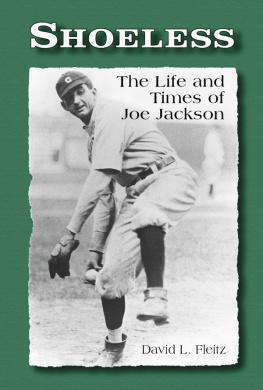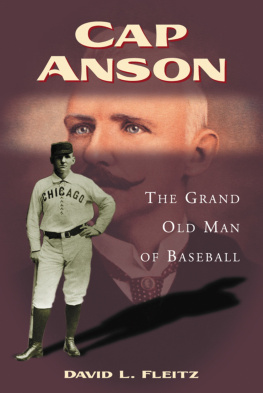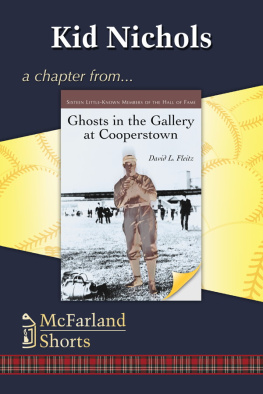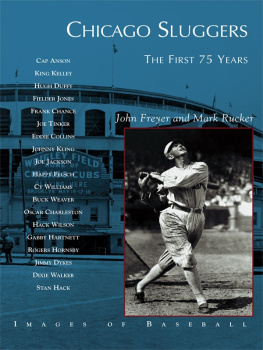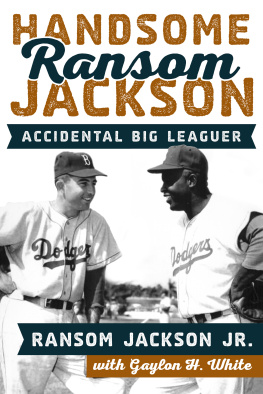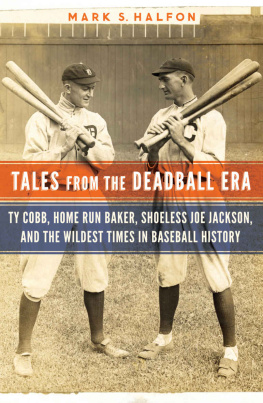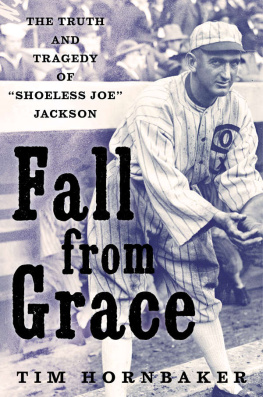
Table of Contents
For Deborah
Acknowledgments: I would like to thank many people without whom this book would never have been possible.
Bruce Markusen, researcher at the National Baseball Library in Cooperstown, New York, made many useful items available to me from the files of the Baseball Hall of Fame. Steven Gietschier of the Sporting News also provided me with timely and valuable data, as did Keisha Whitehead of the Chicago Historical Society and the photographic department of the Cleveland (Ohio) Public Library. Also, the Eugene C. Murdock Collection at the Cleveland Public Library is one of the best collections of baseball reference materials available anywhere, and this proved a fruitful source of information.
I am also indebted to many people in Joe Jacksons hometown of Greenville, South Carolina, for their contributions. The staff members of the Greenville Public Library and the Greenville County Historical Society have been most helpful, as has Jonathan Pait of Bob Jones University, where the photographic collection of the Greenville County Historical Society is housed. Mike Nola, who runs the Shoeless Joe Jackson Virtual Hall of Fame on the Internet, has been a valuable source of information, as has Mrs. Ethel Jackson Copeland, the daughter of one of Joe Jacksons cousins. Mrs. Copeland provided me with the first two photographs that are reproduced in this book.
Eliot Asinof, author of Eight Men Out, kindly allowed me to ask about some of the details of the book that he wrote nearly forty years ago, and Furman Bisher, who interviewed Jackson in 1949, was also most generous with his recollections. I also appreciate the time and attention that I received from Mike Veeck, the son of the former owner of the Chicago White Sox.
Most of all, I am indebted to my wife Deborah, as much for her moral support as for her editing skills.
Library of Congress Cataloguing-in-Publication Data
Fleitz, David L., 1955
Shoeless : the life and times of Joe Jackson / by David L. Fleitz.
p. cm.
Includes bibliographical references and index.
ISBN 0-7864-0978-9
1. Jackson, Joe, 18881951. 2. Baseball playersUnited StatesBiography. 3. Chicago White Sox (Baseball team)History. I. Title.
GV865.J29F54 2001
796.357'092dc21
[B] 2001018318
British Library cataloguing data are available
2001 David L. Fleitz. All rights reserved
No part of this book may be reproduced or transmitted in any form or by any means, electronic or mechanical, including photocopying or recording, or by any information storage and retrieval system, without permission in writing from the publisher.
McFarland & Company, Inc., Publishers
Box 611, Jefferson, North Carolina 28640
www.mcfarlandpub.com
Introduction
I spent a lot of time in libraries when I was a kid.
Id make a beeline over to the shelves where books with the Dewey number 796.357 were kept. Here were housed all the baseball books. I read Ty Cobbs autobiography. And Babe Ruths. And Frankie Frischs, and Ted Williams, and Stan Musials, and those of three dozen other players. I also devoured every book I could find about the history of the American and National leagues by writers like Fred Lieb, Lawrence Ritter, Lee Allen, and many others.
I realized that there was precious little information about the man with the greatest baseball nickname ever. All I knew of Shoeless Joe Jackson was that he once hit .408, hit .356 lifetime, was illiterate, and dropped out of sight after the Black Sox scandal. Thats all. Oh yes, and everyone called him the greatest natural hitter that ever lived.
Why was there so little information on the man with the third highest lifetime batting average in the history of the game? I found that Joe Jackson was relegated to a kind of baseball netherworld after his banishment from the game in 1920. Cobb, Ruth, Mathewson, Aaronall had scores of books and articles written about them, meticulously detailing their lives and careers. Of course, they are all in the Baseball Hall of Fame, and their names are kept alive for each generation of baseball fans. Shoeless Joe, by contrast, is not in the Hall of Fame, and he seemed to drop out of the consciousness of baseball writers nationwide.
However, there were tidbits here and there. Lawrence Ritters The Glory of Their Times (for my money, the greatest baseball book ever written) contained interviews with old-time ballplayers who remembered Jackson and recounted some of his feats. Ty Cobb, a fellow Southerner, maintained friendly relations with Jackson and talked about Joe in his autobiography. Babe Ruth patterned his powerful swing after Jacksons. However, such mentions were few and far between, compared to the voluminous data on other players. Shoeless Joe remained a distant, ghostly figure, lost in time, who became legendary by the very dearth of information about him.
I read Eliot Asinofs fine treatment of the Black Sox scandal, Eight Men Out, and Victor Luhrs The Great Baseball Mystery, on the same subject. Excellent books, both of them, but I wanted to know more about the man himself. What was Joe Jackson like? How many of the myths about him are true, and which ones are false? Did he like the name Shoeless Joe? Did some kid really ask him, Say it aint so, Joe? Why would he throw his career away on such a foolish scheme, the rigging of the 1919 World Series? How guilty, in fact, was he? Should he have been banned for life, or was he more sinned against than sinning? Did he ever learn to read and write?
In 1989, the movie Field of Dreams, based on the novel Shoeless Joe by W. P. Kinsella, was released. The ghost of Shoeless Joe Jackson figures prominently in the story. I loved the game, says Kinsellas Jackson in the book. Id have played for food money. Id have played free and worked for food. It was the game, the parks, the smells, the sounds. Have you ever held a bat or a baseball to your face? The varnish, the leather. This romantic image of Joe Jackson became so ingrained in the public imagination that sometimes you see quotations from Kinsellas novel attributed not to Kinsella, but to Jackson himself. Kinsellas ghostly invention, waxing poetic about the game of baseball, became the public image of the long-dead Jackson.
New attention came Shoeless Joes way with the great success of Field of Dreams. Most of the clamor was of a maudlin, sentimental typepoor Shoeless Joe, an innocent man wronged, booted out of the game he loved in the prime of his career, and all that. Soon a movement to elect Joe Jackson to the Baseball Hall of Fame began to take shape, along with a wave of historical revisionism about the Black Sox. The eight banned players seemed to grow haloes above their heads. Somehow, the scandal became the fault of the greedy club owners, or the vicious new Commissioner Landis making a show of his power, or the nasty Chicago sportswriters.
My interest in writing this book is to find out the truth about Shoeless Joe Jackson. I wont dwell on the particulars of the Black Sox scandal in great detail, since other authors have already covered that same territory, and covered it very well. Im not really interested in discussing which bagman delivered what amount of money to which middleman, or how each group of mobsters and gamblers double-crossed each other. Im interested in Shoeless Joe Jacksonwho he was, and why he did what he did. I will, however, tell the story of the scandal and its aftermath as it relates to Jackson himself.
I also want to separate the truth about the man from the myths that surround him. For example, one oft-told story about Jacksons days with the Philadelphia As starts out with Jackson stood on third base after slamming a mighty triple It doesnt take much effort to find out that Jackson hit no triples for the As at all. Every one of his six hits in a Philadelphia uniform was a single. The other stories about himthat he played in his stocking feet, that he wound up scraping out a living as a pants presser, that he signed his contracts with an X, that he tried to warn the White Sox management about the fix before it happeneddeserve to be examined also.
Next page
